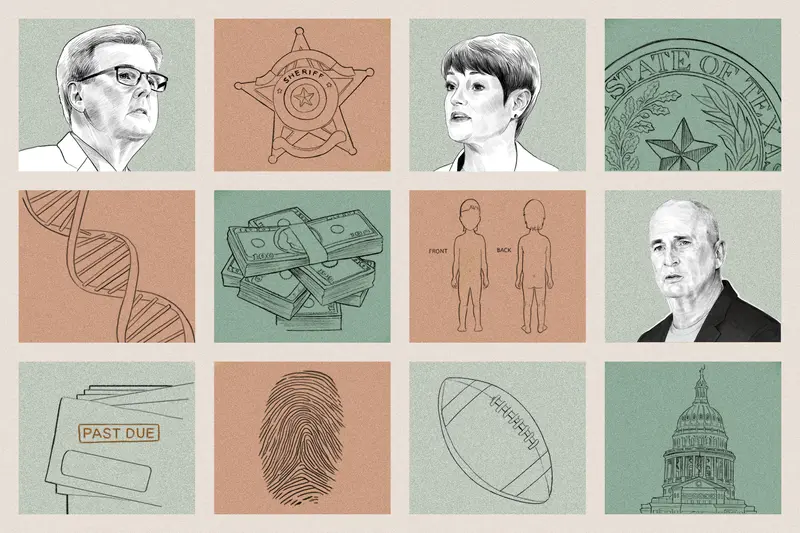For months, Texas lawmakers were on track to spend millions of taxpayer dollars to continue distributing child identification kits to Texas schoolchildren, a program championed by state officials.
In April, both the Texas House and Senate approved preliminary budgets that included money for the National Child Identification Program’s kits.
But less than a month after a ProPublica-Texas Tribune investigation found no evidence the kits have helped locate missing children, lawmakers quietly zeroed out the funding.
The news outlets also found that the Waco-based company that distributes the kits had used exaggerated statistics as it sought contracts in Texas and other states. And the investigation revealed that Kenny Hansmire, a former NFL player who leads the company, had a string of failed businesses, had millions of dollars in outstanding federal tax liens and had previously been barred from some finance-related business in Connecticut by banking regulators because of his role in an alleged scheme to defraud or mislead investors.
“After review and consideration, the House and Senate budget conferees agreed to remove this specific funding request for the upcoming biennium,” said state Sen. Joan Huffman, a Republican from Houston, who chairs the Senate Finance Committee. Huffman did not elaborate on the closed-door discussions of the lawmakers who had been appointed to work out differences between the two spending plans.
A 2021 law states that the Texas Education Agency, which was tasked with purchasing the kits, isn’t required to continue providing them if the Legislature stops the funding. In a statement, a spokesperson said the agency isn’t aware of any “alternative funding sources for the program.”
Hansmire, who did not respond to emailed questions for this article, has said the kits help law enforcement find missing children and save time during the early stages of a search. But none of the Texas law enforcement agencies contacted by the news outlets could recall the kits having helped to find a missing child.
Hansmire previously said that his legal disputes, including his sanction in Connecticut, had been “properly resolved, closed and are completely unrelated to the National Child ID Program.” He also claimed to have “paid debts entirely,” but did not provide details.
Texas lawmakers were among the first in the nation to enshrine into law a requirement that the state purchase the kits. The kits contain an inkpad and a piece of paper where parents can record their children’s physical attributes, fingerprints and DNA. Parents can store the form in their homes and present it to law enforcement if their child goes missing.
In April 2021, state Sen. Donna Campbell, the New Braunfels Republican who authored the law, said Lt. Gov. Dan Patrick and Hansmire had brought her the legislation.
The Legislature allocated about $5.7 million to purchase kits despite numerous government agencies and nonprofits providing similar kits for free or at a lower cost. The envelopes contained the claim that 800,000 children go missing every year. Experts say the figure, which is based on a 1999 study, is inflated and out-of-date in part because it includes hundreds of thousands of children who were reported missing for benign reasons like coming home later than expected.
Hansmire previously told the news outlets that his company’s messaging has shifted away from what he called the “historically high” number of missing children.
Patrick did not respond to requests for comment, but he previously told the news outlets that the company’s broad base of support among the football community and its long history in Texas gave it credibility. He said he didn’t remember meeting Hansmire before the businessman pitched the kits in 2021 alongside former Chicago Bears player and NFL Man of the Year Mike Singletary, who has helped promote the company.
Patrick and Campbell were among a group of politicians honored by the company at an October 2021 Green Bay Packers game.
Working largely with state attorneys general, Hansmire has landed contracts and partnerships in at least a dozen states, including South Carolina, Iowa, Utah and Delaware. Only officials from Delaware responded to requests for comment.
A spokesperson for Delaware Lt. Gov. Bethany Hall-Long, whose office announced the state’s partnership with the company, called the state’s fledgling child ID program “an effective tool” in helping families prepare for the “unimaginable.”
Asked if the state’s partnership with the company, which launched May 24, would change upon learning of Texas’ action, communications director Jen Rini said: “Just like any program we initiate, we will monitor and adjust as necessary.”
Kiah Collier contributed reporting.





